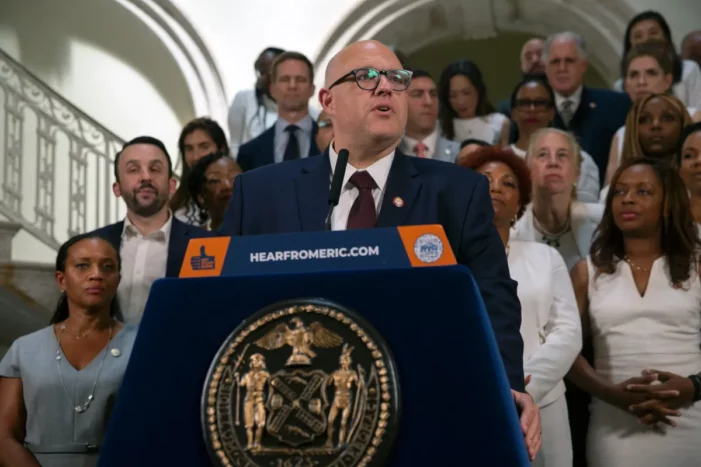Councilmember Justin Brannan (D-Brooklyn) speaks at City Hall about negotiating with mayor’s office before reaching a budget deal, June 29, 2023. Credit: Ben Fractenberg/THE CITY
By Greg David | November 28, 2023
The leadership of the City Council is crafting an alternative to the budget cuts announced by Mayor Eric Adams that potentially includes using the city’s robust financial reserves to stave off immediate cutbacks and asking Albany for tax increases next year to bolster the budget.
In media interviews since the mayor announced his plan to cut the city budget — to deal with the costs of the asylum seekers and looming deficits, he says — finance committee chair Justin Brannan (D-Brooklyn) has called for using the reserves, contending that tax revenues will exceed the administration’s forecasts.
He also has said the Council is preparing a package of “revenue raisers,” among them tax increases that require approval from state lawmakers. Revisiting tax breaks and collecting unpaid fines and fees are also under consideration.
The Council will not raise property taxes, he has promised, which is the only tax action the city can take on its own without approval from the legislature and governor. Layoffs of city workers are also not going to be considered, Brannan said.
The clash between the mayor and the Council is likely to be in the spotlight Dec. 11 when the Council holds a hearing on the mayor’s most recent budget plan.
Like Adams, Brannan has called for more funding from Albany and Washington to deal with migrant shelter and other costs, now estimated by the mayor at $11 billion for this year and next. He also says the administration should end emergency contracts and find more cost-effective ways to deal with the surge of new arrivals seeking aid.
But Brannan as well as city Comptroller Brad Lander and most fiscal experts say the mayor’s exclusive focus on the asylum costs ignores other maneuvers that have created the city’s budget crisis.
Federal COVID relief money is running out, requiring city money to fill the void for programs like 3K education that drew from those funds. The city has also been appropriating money for other programs like housing vouchers for only one year at a time, meaning it must find new funds each year to keep them going.
The combination of those factors means the city is facing a $7 billion gap, or about 6% of total spending, in the 2025 budget that must be adopted by June 30. The deficits for the following two years total just under $13 billion.
But while Brannan claims that budget problems like the ones the city faces “are what reserves are for,” others argue that drawing from the cash cushion is inappropriate and short sighted.
“Rainy day reserves are critical to the City’s ability to protect New Yorkers from a temporary crisis like a recession,” said Ana Champeny, research director at the fiscal watchdog Citizens Budget Commission. “Tapping them to provide a reserve-fueled, one-shot budget injection will provide some relief today, but it does nothing to cure the city’s structural budget ills.”
While Lander declined to comment on Brannan’s plan, his own guidelines for reserves call for them to be used only after key economic indicators — like the total number of jobs declines for two consecutive quarters — or in “extraordinary” circumstances.
The administration has shied from using reserves to fund recurring spending.
Brannan told THE CITY that the Council will make its list of “revenue enhancers” public in the near future.
When questioned by WCBS-TV reporter Marcia Kramer about a mansion tax on expensive real estate sales, recently adopted in Los Angeles, or increased taxes on the wealthy, Brannan said those were the kinds of revenues that should be considered.
With city spending having jumped by 52% in the past decade, higher taxes are uncalled for, said the head of a prominent business group.
“Any revenue-raising proposals coming out of the City Council would be foolish, given the fact that excess spending has created the budget crisis and is what the Council should be trying to roll back,” said Kathy Wylde, CEO of the Partnership for New York City.
The key to narrowing the gap between the Council and mayor may be whether the city will collect more tax revenue than the administration currently forecasts, reducing the deficits and the need for cuts in spending. Brannan says there is at least $1 billion in additional tax revenue that will be collected this year and that the economy remains strong.
This story was published by THE CITY on November 28, 2023

